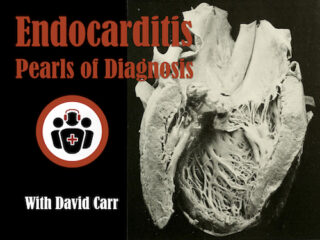
Best Case Ever is a 5-20 minute podcast where an Emergency Medicine Cases guest expert describes a practice changing case, what they learned from it, and clinical pearls and pitfalls you can use on your next shift. Tacit knowledge sharing at it’s best.
Best Case Ever 32 Carr’s Cases – Endocarditis and Blood Culture Interpretation
David Carr discusses his top 10 pearls on endocarditis and blood culture interpretation in this Carr's Cases Best Case Ever on EM Cases - Endocarditis and Blood Culture Interpretation. [wpfilebase tag=file id=560 tpl=emc-play /] [wpfilebase tag=file id=561 tpl=emc-mp3 /]
Best Case Ever 31: Emergency Pericardiocentesis
On this EM Cases Best Case Ever, Andrew Sloas, the brains behinds the fabulous PEM-ED podcast tells the tale of a pericardiocentesis gone bad and what he learned from it. Emergency pericardicentesis can be life saving, but it also carries risks. Dr. Sloas reviews the steps to take to ensure that the pericardiocentesis needle is the the correct place to minimize the risk of intubating the right ventricle of the heart. A discussion of errors of omission and ones of commission follows.... [wpfilebase tag=file id=540 tpl=emc-play /] [wpfilebase tag=file id=541 tpl=emc-mp3 /]
Best Case Ever 29: Drug Induced Aseptic Meningitis
Dr. David Carr presents his third of EM Cases' Carr's Cases. This series features potentially debilitating diagnoses that may be thought of as 'zebras', but actually have a higher incidence then we might think - and if diagnosed early, can significantly effect patient outcomes. Dr. Carr tells the story of young woman with an MRSA supra pateller abscess who was put on trimethoprim sulfamethoxazole and presents looking very ill with a severe headache. Not only has trimethoprim sulfamethoxazole been implicated in aseptic meningitis, but NSAIDS, immunomodulators and antibiotics have also been implicated. The reason this is so important for ED practitioners to know, is that case reports of drug-induced aseptic meningitis have shown that symptoms will resolve completely within 24 hours, once the offending drug has been stopped. Not only that, but if the patient receives the drug again in the future, they are at risk for a more severe case of drug induced aseptic meningitis.
Best Case Ever 28: Anti-NMDA Receptor Encephalitis
Dr. David Carr presents his second of Carr's Cases. This series features some potentially life-threatening diagnoses that may be perceived as zebras, but actually have a higher incidence then we might think - and if diagnosed early, can significantly effect patient outcomes. This Best Case Ever is about Anti-NMDA Receptor Encephalitis, a diagnosis that was only discovered in 2005, and has only recently been recognized by the Emergency Medicine community. Anti-NMDA Receptor Encephalitis may mimic a first presentation of schizophrenia or Neuraleptic Malignant Syndrome. It may present with seizure, altered mental status, autonomic instability or movement disorder in the absence of drug exposure. When you are faced with any of these presentations and no other diagnosis seems to fit, do an LP and send the CSF for anti-NMDA receptor antibodies. The time-sensitive treatment is IVIG and steroids. Anti-NMDA receptor Encephalitis is a must know diagnosis for all emergency medicine practitioners. Learn how to pick up this important diagnosis by listening to Dr. Carr's Best Case Ever and following the links to further resources.
Best Case Ever 27: Pediatric Shock
Ottawa this year, I had the pleasure of discussing pediatric shock and sepsis with Dr. Sarah Reid, a good medical school friend of mine from the Gretzky Year ('99) graduating class. I knew back then that she was heading for PEM educator stardom. Lo and behold, she is the now the director of CME at the Children's Hospital of Eastern Ontario and a national PEM speaker extraordinaire. After recording an eye-opening session on Pediatric Fever Without a Source and Pediatric Sepsis, she told me the story of her Best Case Ever where the initial presumptive diagnosis was sepsis. Maximize your learning and submit your questions on 'Pediatric Fever Without a Source' on the Next Time on EM Cases page.
Best Case Ever 26: Chloral Hydrate Poisoning and Cardiac Arrest
I met up with Mike Betzner at North York General's Update in EM Conference in Toronto. He is the medical director of Air Transport STARS air ambulance out of Calgary and an amazing speaker on the national lecturing circuit. His Best Case Ever on Chloral Hydrate poisoning & cardiac arrest describes a young man in cardiac arrest with resistant Ventricular Fibrillation and Torsades de Pointes. There is only one class of drugs that can get him back into normal sinus rhythm. Dr. Betzner describes how he recognized that this patient was suffering from Chloral Hydrate poisoning and how he saved his life with one simple intervention.







